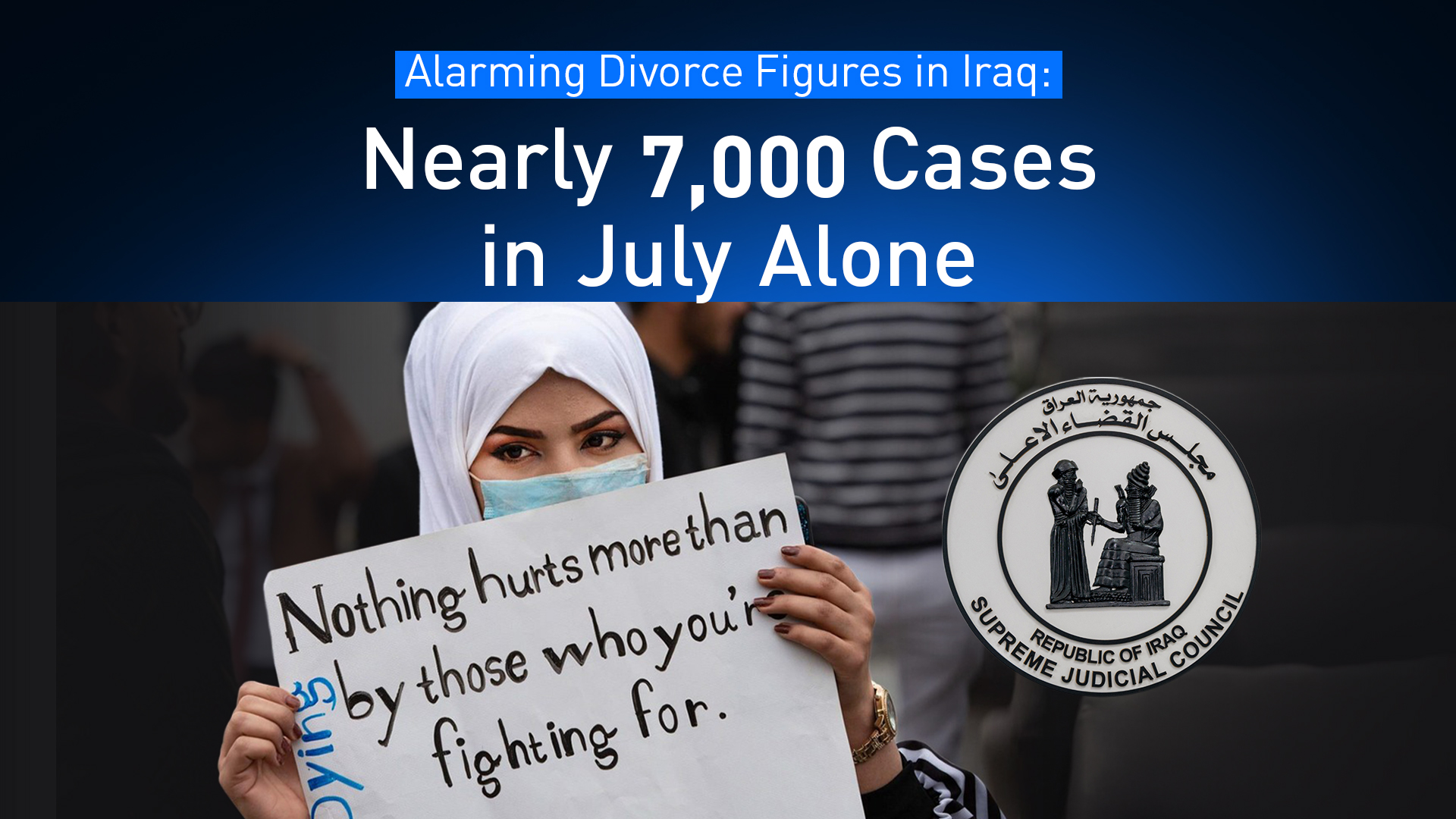Alarming Divorce Figures in Iraq: Nearly 7,000 Cases in July Alone
Official data shows one divorce for every two marriages, reflecting deep social and economic strains.

ERBIL (Kurdistan24) — Iraq’s Supreme Judicial Council on Sunday released official statistics on marriages and divorces registered in Iraqi courts, excluding the Kurdistan Region, for July 2025. The data shows a notable increase in marriages while divorce rates remain persistently high.
According to the report, a total of 22,717 marriage contracts were registered across the country during the month, alongside 6,910 divorce cases.
Baghdad’s courts recorded the highest numbers. The Rusafa side registered 3,017 marriages and 1,299 divorces, followed by Karkh with 2,321 marriages and 1,166 divorces. In Nineveh province, courts registered 3,589 marriages against 580 divorces.
Key Figures by Province
Basra: 2,034 marriages – 742 divorces
Najaf: 751 marriages – 258 divorces
Karbala: 656 marriages – 341 divorces
Dhi Qar: 1,514 marriages – 217 divorces
Anbar: 1,906 marriages – 328 divorces
The statistics highlight a continuing gap between marriage and divorce rates. Roughly one divorce is registered for every two marriages, a ratio that reflects deep-rooted social and economic challenges facing Iraqi families.
The years following the COVID-19 pandemic further accelerated divorce filings, as prolonged economic hardships and domestic tensions tested many households. Meanwhile, social media and technology have played a dual role—both in connecting couples and, according to some sociologists, in exacerbating mistrust and disputes.
While religious and community leaders often encourage reconciliation, legal experts note that divorce is increasingly seen as a practical option for young couples who feel unable to sustain marriages amid Iraq’s shifting social and economic landscape. The persistence of high divorce rates has sparked growing debate on the need for policy reforms, marriage counseling services, and stronger social safety nets to support families.
Divorce has been on the rise in Iraq over the past decade, with courts recording steadily higher numbers each year. Experts point to a range of factors fueling the trend, including economic instability, unemployment, financial debt, and the rising costs of weddings and housing. Social pressures, generational differences, and in some cases, early and forced marriages have also contributed to the strain on family structures.
Arranged Marriages and Educational Gaps Driving Divorce in Iraq
One significant factor lies in the persistence of arranged marriages in many parts of Iraqi society, where couples often have little or no prior acquaintance before their wedding day. In such cases, spouses may discover incompatibilities in personality, values, or desires after marriage, leading to disillusionment and conflict.
Additionally, differences in educational backgrounds between partners can further widen the gap, with mismatched expectations about lifestyle, roles, and decision-making often escalating tensions that end in divorce.
Controversial Child Marriage Bill Sparks National Debate in Iraq
Another highly controversial element shaping the debate around marriage and family in Iraq is proposed legislation in parliament to amend the Personal Status Law to allow the marriage of female children as young as nine under certain interpretations of Islamic jurisprudence. The initiative has provoked fierce backlash from civil society organizations, women’s rights activists, and the educated middle class, who argue that child marriage perpetuates cycles of poverty, deprives girls of education, and exposes them to serious health and psychological risks.
Supporters of the proposal, however, frame it as consistent with religious tradition. The controversy has underscored the divide between conservative and progressive forces in Iraq, adding urgency to ongoing discussions about the future of family law in the country.
A Bleak Future for Marriage and Family Stability in Iraq
Looking ahead, the outlook for marriage and family stability in Iraq appears increasingly bleak. With worsening economic conditions, high unemployment, and growing social pressures, divorce rates are widely expected to climb in the coming years. The persistence of traditional practices, such as arranged and early marriages, combined with deep gender inequalities, suggests little prospect for meaningful reform.
Successive governments in Baghdad have consistently placed family and women’s rights at the bottom of their priorities, focusing instead on political rivalries and power struggles. Without structural change, Iraqi families will likely continue to bear the brunt of policies and social norms that fail to safeguard their future.